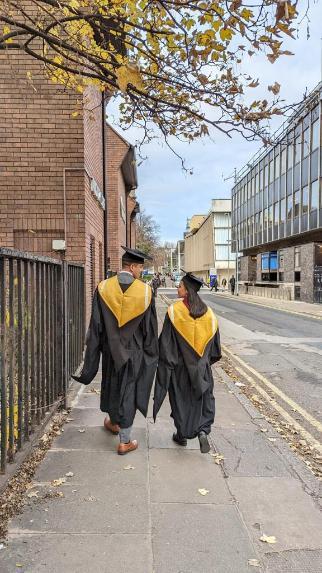Find out more including her experiences including what makes her MBA story unique.
The former team captain of her university’s women’s basketball team left her managerial job with the Indian Super League to embark on a Football Industries MBA in 2021/22.
Since completing her MBA, Shivani is the marketing manager at London Lions, a top professional basketball club that plays in the British Basketball League and Women’s British Basketball League.
Tell us about your current role
As marketing manager at London Lions, my role encompasses:
- Marketing strategy and planning: executing marketing campaigns to drive ticket sales, merchandise sales, and sponsorship revenue
- Communication: working with corporate partners, media outlets and community organisations, to develop promotional offers and packages, maximize revenue and promote the brand
- Analytics and reporting: using data and analytics to measure the impact of marketing delivery and help make data-driven decisions regarding gameday activations and ticketing outreach
- Women’s Commercial Strategy: devising a commercial strategy to drive sponsorship and ticketing revenue.
How do you feel your MBA prepared you for this role?
The Football Industries MBA (FIMBA) equipped me with the skills needed to thrive in my current role. The FIMBA combines core MBA modules such as strategy and organisation alongside football-specific modules including Sport and the Law plus Football Finance.
The programme taught me to approach business problems holistically, backed by data and analysis, and to effectively collaborate with stakeholders. The FIMBA helped build a solid foundation in areas including:
- Problem-solving: Being exposed to real-life business scenarios, including the Football and Finance, Advanced Analytics for Business, and Becoming a Football Executive modules honed my ability to dissect complex problems
- Analytical skills: I learned to break down complex data, draw inferences, and make predictions based on that analysis
- Data-driven approach: focusing on the importance of a data-driven approach to decision-making. The FIMBA taught me to not just rely on intuition but to support this with empirical evidence
- Communication skills: Effective communication was a cornerstone of the MBA programme, and the constant emphasis on presentations, written assignments, and team-based work has made me a more effective communicator
- Networking skills: The FIMBA isn’t just about what happens in the classroom but also about relationships. Engaging with a diverse group of peers, faculty, and business professionals expanded my network and taught me the importance of relationship-building. I'd particulalry like to thank Sue Bridgewater, David Cockayne, Paul Barber, CEO at Brighton and Hove Albion as well as Everton FC, UEFA and the Football Association.
You studied for your MBA with your husband, tell us about that
I moved to the UK within three months of my marriage to complete the FIMBA. My husband and I both work in the sports industry and moving to a new country and leaving our stable jobs in India was a big, exciting adventure!
Throughout the FIMBA, we were the fiercest competitors in the classroom and the best of friends outside. My best memory is when we both cheered for each other at the graduation ceremony. It doesn’t happen often when you and your better half receive a distinction together!

Why did you decide to study for an MBA?
I was keen on sports from childhood, eventually becoming a basketball player. These experiences made me curious about the business of football and why it’s the biggest sport in the world.
I also wanted to sharpen my leadership, communication, and networking skills and doing an MBA was the most appealing option.
After looking at different courses, I choose the FIMBA – it’s the one and only Football Industry MBA in the world and the mix of core MBA and football industry modules were a perfect fit for me!
Why did you choose the Management School?
- The School’s triple accreditation
- Recommendations from alumni
- The Women in Football Scholarship, I was awarded for my professional and academic excellence.
Coming from a society where women to this day are told what to do, what to wear and how to behave, I would not have considered moving to the UK had there not been a scholarship like the Women in Football one.
How did you find living in Liverpool?
Liverpool is a vibrant city teeming with cultural heritage and a buzzing music scene. The city never sleeps! The beautiful waterfront and historic architecture were the cherries on top.
And of course, Liverpool is a hotbed for sport, particularly football with two premier league clubs, so studying at the University of Liverpool Management School made my time here a genuinely unforgettable experience!
What advice would you give to someone thinking of studying for an MBA?
- Maintain a LinkedIn profile
- E-network with people before moving to the UK
- Use your time to interact with teaching staff outside the lectures. Also speak with the dedicated MBA career and leadership coach, Bernie Lyons for some career guidance as there are opportunities that you might not have heard of
- Don’t be reckless with your assignments – they can be a great source of creativity!
